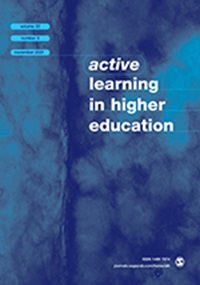Reducing free-riding in group projects in line with students’ preferences: Does it matter if there is more at stake?
IF 3.8
1区 教育学
Q1 EDUCATION & EDUCATIONAL RESEARCH
引用次数: 3
Abstract
Reducing free-riding is an important challenge for educators who use group projects. In this study, we measure students’ preferences for group project characteristics and investigate if characteristics that better help to reduce free-riding become more important for students when stakes increase. We used a discrete choice experiment based on 12 choice tasks in which students chose between two group projects that differed on five characteristics of which each level had its own effect on free-riding. A different group project grade weight was presented before each choice task to manipulate how much there was at stake for students in the group project. Data of 257 student respondents were used in the analysis. Based on random parameter logit model estimates we find that students prefer (in order of importance) assignment based on schedule availability and motivation or self-selection (instead of random assignment), the use of one or two peer process evaluations (instead of zero), a small team size of three or two students (instead of four), a common grade (instead of a divided grade), and a discussion with the course coordinator without a sanction as a method to handle free-riding (instead of member expulsion). Furthermore, we find that the characteristic team formation approach becomes even more important (especially self-selection) when student stakes increase. Educators can use our findings to design group projects that better help to reduce free-riding by (1) avoiding random assignment as team formation approach, (2) using (one or two) peer process evaluations, and (3) creating small(er) teams.根据学生的喜好减少团体项目中的搭便车:是否有更多的利害关系?
对于使用小组项目的教育工作者来说,减少搭便车是一个重要的挑战。在本研究中,我们测量了学生对小组项目特征的偏好,并调查了当风险增加时,那些更有助于减少搭便车行为的特征是否对学生更重要。我们使用了一个基于12个选择任务的离散选择实验,在这个实验中,学生们在两个小组项目中进行选择,这两个小组项目有五个不同的特征,每个特征的水平对搭便车有自己的影响。在每个选择任务之前呈现不同的小组项目分数权重,以操纵小组项目中学生的利害关系。在分析中使用了257名学生受访者的数据。基于随机参数logit模型估计,我们发现学生更喜欢(按重要性排序)基于时间表可用性和动机或自我选择的分配(而不是随机分配),使用一个或两个同伴过程评估(而不是零),一个由三个或两个学生组成的小团队(而不是四个),一个共同的成绩(而不是一个划分的成绩),与课程协调员进行讨论,但不采取制裁措施,作为处理搭便车行为的方法(而不是开除会员)。此外,我们发现,当学生的赌注增加时,特征团队形成方法变得更加重要(尤其是自我选择)。教育者可以利用我们的发现来设计小组项目,通过(1)避免随机分配作为团队形成方法,(2)使用(一个或两个)同伴过程评估,(3)创建小的(er)团队,更好地帮助减少搭便车。
本文章由计算机程序翻译,如有差异,请以英文原文为准。
求助全文
约1分钟内获得全文
求助全文
来源期刊

Active Learning in Higher Education
EDUCATION & EDUCATIONAL RESEARCH-
CiteScore
13.20
自引率
12.00%
发文量
31
期刊介绍:
Active Learning in Higher Education is an international, refereed publication for all those who teach and support learning in higher education (HE) and those who undertake or use research into effective learning, teaching and assessment in universities and colleges. The journal is devoted to publishing accounts of research covering all aspects of learning and teaching concerning adults in higher education. Non-discipline specific and non-context/country specific in nature, it comprises accounts of research across all areas of the curriculum; accounts which are relevant to faculty and others involved in learning and teaching in all disciplines, in all countries.
 求助内容:
求助内容: 应助结果提醒方式:
应助结果提醒方式:


